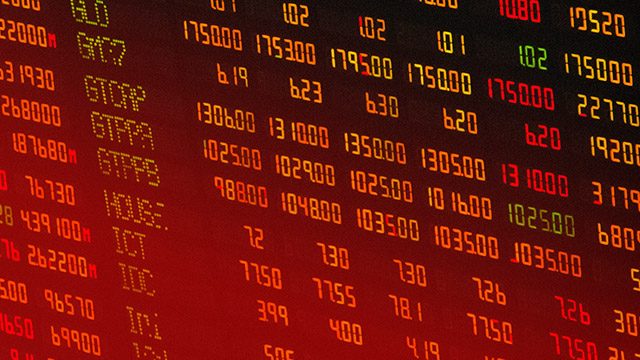SUMMARY
This is AI generated summarization, which may have errors. For context, always refer to the full article.

MANILA, Philippines – The Philippine Stock Exchange index (PSEi) continued to slip on Thursday, January 30, as concerns surrounding the 2019 novel coronavirus (2019-nCoV) lingered globally.
The bellwether PSEi lost over 69 points or 0.9% and fell to 7,392. This is the PSEi’s new one-year low since December 26, 2018.
Net foreign selling at the local stock market stood at -$10.1 million after the -$6.9 million registered on Wednesday, January 29.
Note that the local bourse closed ahead of the Department of Health’s announcement of the first case of the 2019-nCoV in the Philippines. (READ: Novel coronavirus or 2019-nCoV: What we know so far)
The peso also weakened to P50.96 to $1 on Thursday, the weakest in a week and among the weakest in 3 weeks.
Rizal Commercial Banking Corporation chief economist Michael Ricafort attributed the depreciation to “increased global risk aversion” of investors to most Asian currencies due to the novel coronavirus cases.
Ricafort said the following businesses are likely to take a hit due to the coronavirus scare:
- Travel
- Tourism
- MICE (meetings, incentives, conventions, exhibitions)
- Airlines
- Hotels and accommodation
- Leisure
- Entertainment
- Gaming and casinos
- Restaurants
- Catering
- Retail trade
However, Ricafort noted that the Philippine economy is less dependent on foreign tourism as the main source of economic growth.
“Thus, the adverse effects of any slowdown in tourism business due to the coronavirus, especially if temporary and eventually contained, could have less or minimal impact on the local economy or GDP (gross domestic product) growth compared to other ASEAN or Asian countries that are more dependent on tourism and exports as major contributors to their respective economies or GDP,” Ricafort said.
The novel coronavirus is expected to hit the global economy, especially China. – Rappler.com
Add a comment
How does this make you feel?
There are no comments yet. Add your comment to start the conversation.